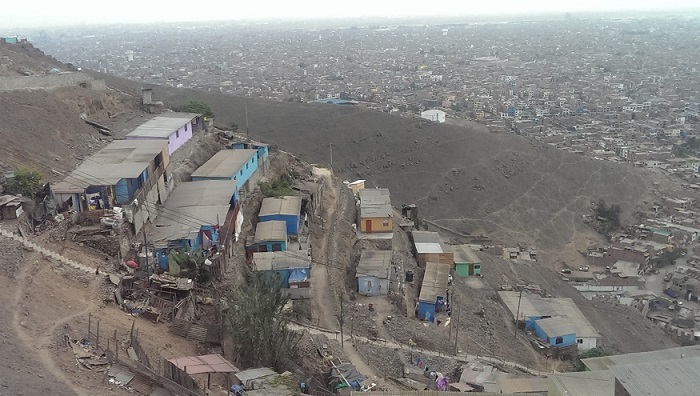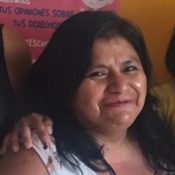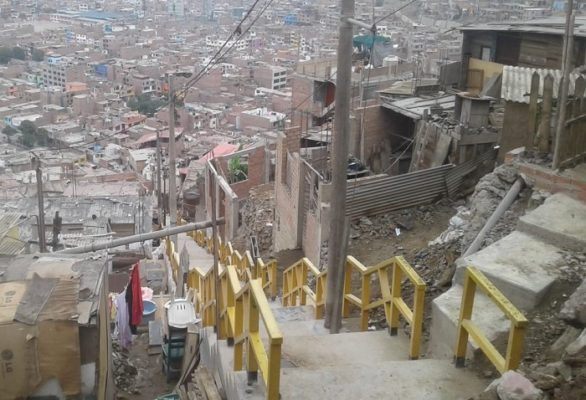For the Dignity of All Worldwide

Sarita Guevara, an ATD Fourth World activist, talks about life during the pandemic in Lima, Peru. On one of the most poverty-stricken hillsides of the city, people are trying to prevent the spread of Covid-19 by taking care of each another and helping neighbors.
“I’m always looking for how I can help other people”
I’ve been doing a bit of everything to keep my family from experiencing hardship. My husband is older and now he can’t go out. When we both worked, we always used to buy a few little extras, like yoghurt or a cake. Now it’s a luxury to be able to eat those things.
Sometimes my neighbors or friends let me know that certain places are selling chicken at a more reasonable price. Right away I call other people to tell them! Either we go there together or I go to line up. Sometimes neighbours will give me a little money to stand in line for them. Older people used to call to ask me to do their shopping. I would deliver things to their house and earn a little money that way. So that’s how I’ve been getting by, running around here and there.
Yesterday some people called me because I had made three dozen face masks. They said, “Sarita, we need two more.” I have the fabric, but I don’t have any more thread or elastic. So I said to one of my friends, “Why don’t we work on this together and then we can both earn some money?”
That is the only kind of help I can give. Otherwise I can’t do very much. I try to bring a little money home and I also try to help out other people. I can’t sit still. I’m always trying to see what I can do to help other people.
Now I know how my mother felt
It’s never happened before that my children were hungry and there was nothing to give them to eat. Now I understand how my mother must have felt. It hurts when your child asks you for something and you can’t give it to them.
- I was one of four siblings. My mother used to go to work very early. She’d come back to cook, then go off again to clean houses or wash other people’s clothes. Sometimes she was out until 1 am. She always tried to make sure that we didn’t go without what we needed for school or other essential things. But there were days when we would ask her for something and she would say, “No, I don’t have any money because they didn’t pay me today.”
When my children say to me, “Mom, I want that,” it’s hard to tell them we can’t afford it. With my mother [when I was young] we didn’t have much to put on the table. It was like that for my oldest son for awhile when he was little, but I don’t think he realised it at the time. I never wanted my other children to live like that.
I have to try not to get depressed so they don’t see me feeling sad or hopeless. Because I’m their rock, I have to keep calm and stay well.
I’ve always liked helping other people

When I was a child, my mother worked so much that my brothers and sisters and I would go help her out at the market nearby. People never gave us tips but they would give us breakfast or lunch. Sometimes people gave us some eggs or a kilo of rice so my mother wouldn’t be so upset when we went home. When my oldest brother got home from work, he’d give us a hard time for trying to help because we were little. He’d say, “Those are adult responsibilities.” But we’d insist, “We can help out too!” And we’d keep going out to try to find a way to contribute something to the family.
Since I was a little girl, I’ve always liked helping other people. During lockdown, we were cooking over firewood for a time to save money. But we stopped because one family’s house in another shanty town burned down completely. The families around here don’t have much right now, but almost everyone gave something to help that family out. My son José took some clothes and other supplies to them. I’ve learned that it’s not just about giving or receiving. It’s also about, if you have something, giving it from the heart.
I want my children to learn to be more caring. They’re already generous, but I want them to learn to be more so and to value people who have the least.
During this time of quarantine, I wish people who can afford expensive things would stop and think about all the people who are really having a difficult time. There are children in La Vizcachera who don’t have any water. We are like millionaires here because we have water, electricity, and food to eat. But people there don’t have any of that. We need to help each other out.
Don’t take any more risks

Yesterday someone called to tell me there was a case of Covid-19 on the hillside, and it was like a slap in the face. So I talked with my family about how we could help them. We decided that if they had to go to the hospital, we would collect money from the neighbours to buy medicine if they needed it. Then the healthcare assistant came and did a test. She said it wasn’t Covid, only bronchitis, so we felt a lot better! Even so, we organised a collection to get the neighborhood stairs sanitized against Covid.
This whole situation makes me think about how I really want to live my life. It makes me wonder how I can support other people and whether there is more I can do to help out. I want to do everything I can, but I also want be careful about my health and not put my family at risk. At the beginning, I thought I wouldn’t get sick. But now that there are more and more cases, I’m starting to feel a little scared too.
My neighbors just told me, “They closed the market, so don’t take any more risks. You shouldn’t go anywhere. If you need something, just let us know.” But before, if they needed help, they would call up and say, “Could you buy something for me?” Now they’re not asking me for things anymore. Instead they tell me, “Be careful. Protect yourself. Don’t go out.” That’s something I value a lot.
Teaching four levels of school at the same time
I’ve even had to become my children’s school teacher. I have to teach four levels: pre-school, primary, secondary, and high school.
Sometimes I have to sit down with Adrián who’s in pre-school. I have to take a picture to prove he’s been working. And we have to draw or watch the videos that the teacher sends. We also make little paper dolls.
In primary with Matías, we’re working on addition and multiplication. I correct him or tell him when he’s done it right. It’s really satisfying because last year the teacher complained to me, “Matías doesn’t want to write. He’s good at math, but he doesn’t communicate very well.” So a few days ago, I showed him: “Look, Matías, this is how you do it.” And now he’s writing by himself! He asks me to write short sentences and then he copies them into his notebook. Sometimes I let him figure things out for himself. And in PE, we have to dance! We even made puppets out of socks.
But in secondary, my kids say to me, “Mom, I don’t understand this.” And I have to search google for what I don’t understand either. Then I can explain it to my daughter. Even with Cristian, I have to remind him to be ready for his class on TV at 2 in the afternoon.
With José I have to be the camerawoman to record videos with a cell phone when he has a test. And I also have to go ask the neighbors if he doesn’t have things he needs to present his work at school. José passed a test with flying colours this Saturday. He had to present his work to three people in order to qualify.
Some children in Marco’s classroom have computers so they can work online. But other people like us don’t have a laptop. One day I told the teacher that our home life is pretty hard. We live way up the hill and we don’t have the same things other students have. After that, all the mothers started complaining too. So then they said that school work would not come by Internet but through the TV or radio instead.
But the teacher still wants us to print lessons from the Internet. Sometimes there are 8 or 12 sheets. Every day I have to get printing and copying done so my children can do their homework. We copy two sheets by hand so I don’t have to spend so much on printing. My son Marco writes out one sheet and I write out the other. But the rest I have to get printed because all that writing is exhausting.
School should be the teacher explaining things to the students. At first the teacher was doing that, but now she doesn’t any more. She just sends audio via whatsapp so the children have something to do. So I’ve had to become the teacher.
I’ve always worked hard. But now sometimes I’m so tired when I get home that I just barely manage to explain my daughter’s lessons to her. Now that I’m the one teaching my children, I take my hat off to all teachers because you really have to be patient. You have to work alongside each of them with their own way of learning. With some of them you have to dance, or with others you have to make them laugh.
Everyone in the world has dignity
I think if you can help other people then you should do that. But if you can’t – because not everyone can – you should at least give people some encouragement. If someone says something encouraging to you, it sticks in your mind. And that gives you strength to keep going when things get hard.
At first I thought ATD was people who were trying to help others. But now that I know what the letters ATD mean, I try to practice them every day. It means “All together in dignity.” But it’s not just your own dignity. It’s that everyone in world has dignity, whether you know them or not.
More on ATD in Peru.
ATD Peru on Facebook
Article photo: Vista Alegre Hillside in Lima, Peru, 2018 ©ATD Fourth World.

